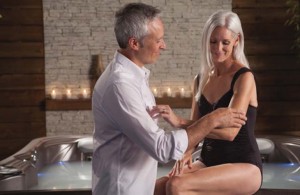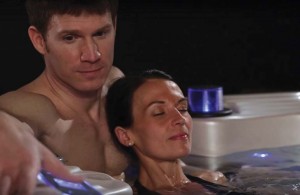Promoting hydrotherapy is good for everyone. The therapeutic benefits hot tub and swim spa owners enjoy are vast—from physical to emotional stress relief to alleviating aching muscles and pain caused by arthritis. The list of health benefits are many, as is the number of people seeking relief. People are looking for alternative methods to traditional medicine to maintain health and wellness, and hydrotherapy may just be what the doctor ordered for consumers and hot tub retailers alike.
What is hydrotherapy?
Hydrotherapy is the use of water to treat a disease or to maintain health. Water has many healing properties. That said, hot tubs and swim spas are a hydrotherapy haven; the warm water improves blood flow, relaxes muscles, and relieves joint pain. The hot tub industry knows its products can help improve customers’ lives; however, this message needs to be brought to the consumer’s attention. These health benefits are a major selling feature; therefore, to help start this conversation with prospective clients the following discussion points should be addressed as reasons why a hot tub or swim spa purchase is the right decision.

Special seating and pulsating jets targeted to penetrate and massage specific muscle groups or an area that might need extra attention can help alleviate aching muscles and pain caused by arthritis.
The importance of reducing stress
It has been estimated 75 to 90 per cent of all visits to primary care physicians are for stress-related problems. Job-related stress is the leading source for adults; however, stress levels have also escalated in children, teenagers, college students, and the elderly.
Everyone has stress and most struggle to manage it. A recent study by the American Psychological Association shows stress management is extremely or very important to 61 per cent of adults, but only 35 per cent are successful at it. This is troublesome because research also shows stress is the leading cause of many other health-related issues, such as depression, anxiety, heart attack, stroke, hypertension, immune system disturbances, as well as autoimmune diseases like rheumatoid arthritis (RA) and multiple sclerosis (MS).
Stress can also have direct effects on the skin, the gastrointestinal system, and can contribute to sleep disorders and degenerative neurological maladies like Parkinson’s disease.
Just as there are many factors that create stress, there are several options to help manage it. A hot tub, for instance, can be a great stress-reliever for the mind and body. It is a place to escape the hustle and bustle of everyday life, where warm water and pulsating jets provide a massage experience that assists pain management, soothes sore muscles, and relieves tension to achieve relaxation.
Some hot tubs offer special seating and jets targeted to penetrate specific muscle groups or an area that might need extra attention. They also might offer additional relaxation features such as fountains, the ability to play music, and aromatherapy.
Exercise is also known to help reduce stress. In this case, swim spas allow bathers to complete a full workout without putting additional stress on joints due to the water’s buoyancy, which eliminates the effects of gravity by supporting the body’s weight. These units allow bather’s to swim-in-place, perform water aerobics, or just stretch—the time spent being active in a swim spa can help the body rebuild and relax, as well as alleviate stress.
Relief from arthritis symptoms

The soothing warmth and buoyancy of the water in a hot tub or swim spa makes it a safe and ideal environment for relieving arthritis pain and stiffness.
Arthritis is a condition which affects more than 4.6 million Canadian adults—a number that is expected to increase to an estimated 7.5 million by 2036. Despite there being more than 100 different types of arthritis, the Arthritis Foundation in the U.S., found hot tubs to be helpful in alleviating pain associated with several types, including osteoarthritis, RA, and fibromyalgia. The foundation states the soothing warmth and buoyancy of the water in a hot tub or swim spa makes it a safe and ideal environment for relieving arthritis pain and stiffness.
A hot tub can help provide relief for a variety of medical conditions. It starts with the basics of hydrotherapy. When immersed in warm water, the body’s temperature rises, causing blood vessels to dilate, which increases circulation. Once a bather has acclimatized to the water’s temperature, they can add movement, such as a gentle water exercise to limber stiff joints and muscles. The water not only supports joints to encourage free movement, but also acts as resistance to help build muscle strength. Swim spas are beneficial in this case, as they are larger vessels that allow bathers to spread out to get the most out of their aquatic exercises.
Further, jet nozzles release warm water and air, which massages the body and helps to relax tight muscles. Hydrotherapy has also been said to help reduce side effects such as depression and fatigue, which often occur with arthritis.
Soaking before bedtime
Today, everyone works long hours, juggles multiple responsibilities, and is constantly on the go. This begs the question, if everyone is so busy, why do they have trouble sleeping?

Some hot tubs offer special seating and jets targeted to penetrate specific muscle groups or an area that might need extra attention.
It is estimated between 50 and 70 million North Americans chronically suffer from a disorder of sleep and wakefulness, hindering daily functionality and adversely affecting health and longevity. There are approximately 90 distinct sleep disorders; most are marked by one of the following symptoms: excessive daytime sleepiness, difficulty initiating or maintaining sleep; and abnormal events occurring during sleep. The cumulative long-term effects of sleep loss and disorders have been associated with a wide range of health consequences, including an increased risk of hypertension, diabetes, obesity, depression, heart attack, and stroke.
There is nothing better than a good night’s rest; however, many people cannot achieve this naturally and, as a result, turn to sleep aids. However, many doctors suggest alternatives to medicine to remedy this problem, and setting a calming nightly routine is one of them. Part of this routine should be soaking in a hot tub. Hot water therapy triggers the body’s natural sleep mechanics—a 20 minute soak before bed each night can help relieve stress and anxiety, thus making it easier to fall asleep. This routine can actually induce a more restful, deeper sleep. When combined with aromatherapy, stress relief and overall relaxation can be heightened.
People also sleep better and feel more alert during the day if they exercise. A study in the December 2011 journalMental Health and Physical Activity, which comprised more than 2600 men and women, ages 18 to 85, found that 150 minutes of moderate to vigorous exercise per week provided a 65 per cent improvement in sleep quality. With a swim spa, there are no more excuses for not going to the gym as it is conveniently located in the backyard and be used year-round.
Minimizing pain
Pain affects more North Americans than diabetes, heart disease, and cancer combined. Pain is cited as the most common reason people seek the healthcare system and accounts for up to 78 per cent of visits to the emergency department.
According to the Committee on Advancing Pain Research, Care, and Education, U.S. figures have documented the cost of chronic pain in adults, including healthcare expenses and lost productivity, is between $560 and $630 billion annually. Based on these figures, it is estimated the annual cost of chronic pain in Canada is at least $56 to $60 billion.
With this in mind, customers should be asked what keeps them up at night and/or if they suffer from any previous injuries, or chronic joint or muscle pain. If they say yes, the idea of soaking in
a hot tub should be used as a selling feature as a way to provide the relief they are looking for.
Time to reconnect

Hot tubs can be a ‘device-free’ refuge where couples can reconnect and discuss the day’s events.
Today, everyone is extremely busy and easily distracted. As such, many potential hot tub and/or swim spa buyers may simply be looking for a product where they can ‘unplug’ and spend some quiet time with family.
A hot tub or swim spa can provide this type of getaway—even if it is a 20-minute soak to escape from a chaotic day to contemplate one’s thoughts. Hot tubs can be a ‘device-free’ refuge where couples or families can reconnect and discuss the day’s events all while gazing at the stars and relaxing without any distractions.
The aforementioned should be used to promote a hot tub and/or swim spa business and its products. Yes, hot tubs and swim spas have high entertainment value, but the benefits of hydrotherapy should not be forgotten, as it can improve the customer’s quality of life. This marketing practice will not only help sell more hot tubs, but also gain lifetime customers.
This article was written by Lindy Rickert and originally appeared on Pool & Spa Marketing [link].
